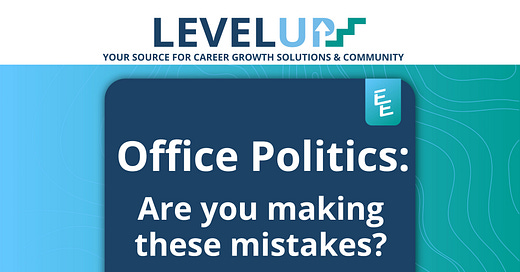Welcome to a paid member-only edition of Level Up: Your source for career growth solutions & community by retired Amazon Vice President, Ethan Evans. If you’d like to become a paid member, see the benefits here, and feel free to use this expense template to ask your manager.
Office politics are the number one career blocker coaching clients cite to me.
People hate them.
We see illogical decisions made for personal benefit and it is frustrating.
We feel powerless.
Here’s how you can handle office politics.
First, office politics are hard to define.
But, we know them when we feel them.
It is that feeling that decisions are not made based on rationality, what the data shows, or what is best for the project.
We are taught that decisions should be made with data and analysis.
And, we are told that at our company we share a common purpose: to help the company sell its products or services, to serve customers, and to grow and succeed.
Examples of office politics:
When decisions are not made to serve the company's purpose but are instead made to bolster the standing, budget, visibility, or power of the leader.
When unrelated projects are tied together to get leverage: ”We'll do this thing, but only if you do that thing.”
Office politics are frustrating because our normal tools of influence stop working.
Data and logic no longer work because the “politician” changed the decision criteria.
On May 30 (Thursday) I am giving a live online career talk on “Who managers promote and why” as part of Maven’s Lightning Lesson. The event is free and open to everyone. RSVP below to also get the video recording.
However, because we are expected to use data and logic, politicians cannot admit their actions.
This leads them to conceal their true motives (sometimes even from themselves) and to lie about their goals.
It also leads them to attack the data or you to justify their hidden agenda.
This is why politics are so cancerous.
Good companies and good leaders reduce office politics.
If you are a leader, avoid them and fight them for your team.
But, we all face politics at some point, so it serves to get good at them.
How to Build Relationships WITHOUT Coming Across as Personal-Interest Driven
Invest in others and provide value first.
“People do not usually invest in people they do not know or have a relationship with.”
If you want to go in-depth on this topic, consider my on-demand course, Leadership Networking.
Watch this highlight clip of Ethan answering an audience-submitted question. In the full 60-minute talk, Ethan answers 11 popular career questions (as voted by community members) followed by live audience Q&A from a Level Up paid member-only event.
Do you know what “currency” your company’s C-Suite prioritizes?
Read this advice on corporate politics from an EVP with a 3,000 person team.
Two key points:
What is valued in an executive varies based on company culture. Find out what's valued so you can develop and demonstrate those skills.
Understanding corporate financials is important to be an executive.
6 actions to navigate office politics:
Figure out the real agenda. What does that person actually want?







